|
|
|
Sort Order |
|
|
|
Items / Page
|
|
|
|
|
|
|
| Srl | Item |
| 1 |
ID:
089389
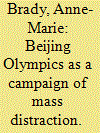

|
|
|
|
|
| Publication |
2009.
|
| Summary/Abstract |
From 2006 to 2008 the predominant theme in the Chinese media was preparations for the 2008 Olympics. These preparations were not merely about putting up new sports stadiums; China also underwent a massive public etiquette campaign, aimed at "civilizing" Chinese citizens. This was nominally so they could be good hosts during the Beijing Olympics. The 2006-08 emphasis on Olympic-related news coverage and the ongoing public morals campaign was what I have called a campaign of mass distraction: a propaganda campaign designed to mobilize the population around a common goal, and distract them from more troubling issues such as inflation, unemployment, political corruption and environmental degradation. This article discusses China's Olympics propaganda within the context of the modernization of the Chinese Communist Party's propaganda system - which has included incorporating practices originating in modern democratic states - and considers in what way changes in the propaganda system reflect changes in China's system of political control.
|
|
|
|
|
|
|
|
|
|
|
|
|
|
|
|
| 2 |
ID:
089391
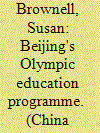

|
|
|
|
|
| Publication |
2009.
|
| Summary/Abstract |
Starting in 2005, the largest "Olympic education" programme ever implemented by an Olympic host country was carried out in schools in Beijing and across China. By looking at the ways in which the policies for this programme were created and implemented, this article challenges the common perception that there was a "master plan" surrounding all aspects of the Beijing Olympics that was imposed by the party-state from the top down with the singular goal of promoting nationalist and communist ideology. It makes the point that by contrast with the suzhi ("quality") education that preceded it, Olympic education contained a de-politicized patriotic education that linked national identity with sports heroes rather than political systems, and re-situated Chinese national identity within an international community in which it would now take its place as an equal partner.
|
|
|
|
|
|
|
|
|
|
|
|
|
|
|
|
| 3 |
ID:
089392


|
|
|
|
|
| Publication |
2009.
|
| Summary/Abstract |
The opening ceremony of the 29th Olympiad in Beijing was celebrated in China as an opportunity for the country to "tell its story to the world." This article offers a forensic analysis of that story and how it was created under Party fiat with the active collaboration of local and international arts figures. In a scene-by-scene description of the ceremony, the article also reviews the symbiotic relationship of avant-garde cultural activists and the party-state, a relationship that has continuously evolved throughout the Reform era (since 1978). It also discusses contentious historical issues related to the revival of real and imagined national traditions in the era of China's re-emergence on the global stage.
|
|
|
|
|
|
|
|
|
|
|
|
|
|
|
|
| 4 |
ID:
089393
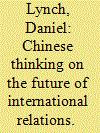

|
|
|
|
|
| Publication |
2009.
|
| Summary/Abstract |
China's evidently unstoppable "rise" energizes PRC political and intellectual elites to think seriously about the future of international relations. How will (and should) China's international roles change in the forthcoming decades? How should its leaders put the country's rapidly-increasing power to use? Foreign China specialists have tended to use an overly-streamlined "resisting" the West versus "co-operating" with it (or even simpler "optimistic" versus "pessimistic") scale to address such questions, partly reflecting the divide between Realism and Neoliberalism in American international relations theory. By 2002, a near-consensus had developed (though never shared universally) that China had become an increasingly co-operative power since the mid-1990s and would continue to pursue the policy prescriptions of Neoliberal international relations theory. But using more nuanced "English school" analytical techniques - and examining the writings of Chinese elites themselves, aimed solely at Chinese audiences - this article discovers an unmistakably cynical Realism to be still at the core of Chinese thinking on the international future. Even elites who appear sincere in their promotion of co-operation firmly reject "solidarism" among the world's leading states and insist upon upholding the difference between China and all others. Many demand - and foresee - China using its future power to pursue world objectives that would depart in significant respects from those of the other leading states and non-state actors.
|
|
|
|
|
|
|
|
|
|
|
|
|
|
|
|
| 5 |
ID:
089398


|
|
|
|
|
| Publication |
2009.
|
| Summary/Abstract |
This study examines civic solidarity in Hong Kong and Taiwan at key democratic moments. Using political cartoons published during the 1995 LegCo election campaign in Hong Kong and the 2000 presidential election campaign in Taiwan, our findings indicate that the cultural codes of liberty, though not typically considered part of traditional Chinese values, have become the dominant cultural source for discourse in civil society. Values of caring and state paternalism, which resemble subsets of Confucian values, exist as competing, alternate cultural codes. In Taiwan, politically-divided members of civil society appear to share the same cultural language, thereby fostering a basis for mutual engagement. Nevertheless, little mutual engagement is actually found among politically divergent discourses. In Hong Kong, even a shared cultural language cannot be documented. The conclusion discusses the broader implications of these findings for the inclusive potential of civic discourses, amidst competing identity claims, in Hong Kong and Taiwan.
|
|
|
|
|
|
|
|
|
|
|
|
|
|
|
|
| 6 |
ID:
089390
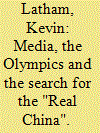

|
|
|
|
|
| Publication |
2009.
|
| Summary/Abstract |
The Beijing Olympics were about more than just sporting competition. They were about China and its role on the international stage. The Games were explicitly recognized for their role showcasing China's economic, technological, cultural, social and environmental achievements to the rest of the world. The Beijing Games were therefore inevitably going to lead to a process of contestation between competing representations, understandings and identifications of China, and a common motif of this process became the designation of what is or is not the "real China." This article focuses on the notion of the "real China" and the debates and contestations surrounding it in Chinese and foreign media over the months running up to and during the Olympics. It will identify what these debates and contending claims about the "real China" may reveal for a broader understanding of the role of media in the country and our need to rethink our approaches to both.
|
|
|
|
|
|
|
|
|
|
|
|
|
|
|
|
| 7 |
ID:
089397
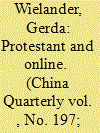

|
|
|
|
|
| Publication |
2009.
|
| Summary/Abstract |
This article presents Aiyan, an electronic house church publication, as a case study of a resistance community using up-to-date technology in the dual context of China's modernization and government repression. Based on detailed content analysis supported by results from fieldwork, the article introduces Aiyan's background as an underground publication, its online existence, its visual character, its content and its aims. It then analyses Aiyan's attempts at identity formation within the complex realities of religious activity in China, and finally identifies five main areas of political engagement within Aiyan: freedom of religious belief and legalization of status; rights awareness and rights education; defiance against the regime; rural-urban co-operation; and engagement of liberal intellectuals. The article concludes with an evaluation of the possible influence this sector of the house church community may have on China's political transformation.
|
|
|
|
|
|
|
|
|
|
|
|
|
|
|
|
| 8 |
ID:
089395
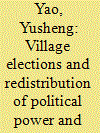

|
|
|
|
|
| Publication |
2009.
|
| Summary/Abstract |
This study of competitive elections in a northern China village identifies two contradictions: one between villagers and village officials, the other between village elite and those seeking power. The one between villagers and the old leadership in the village focuses on the latter's corruption and bad governance, which had led to serious erosion and unfair distribution of the collective property. The one between villagers and the new leadership lies in the latter's failure to address the problems left by the old leadership. Both led to popular discontent and fuelled political participation. The contradiction between elite members focuses on competing for political office, which has resulted in the formation of factions and factionalism in both election and post-election politics and has become a salient feature of the village politics. The investigation of this village with governing problems found that free elections have brought about a radical redistribution of political power, but little satisfaction to villagers because their deep-seated desire for a fair redistribution of the collective property remains unfulfilled.
|
|
|
|
|
|
|
|
|
|
|
|
|
|
|
|
| 9 |
ID:
089396
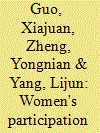

|
|
|
|
|
| Publication |
2009.
|
| Summary/Abstract |
Drawing on the data collected from three surveys in China's Zhejiang province during the period from 1999 to 2006, this article attempts to examine women's political participation in village autonomy and village elections in China. The data show that while men and women have obtained a very similar level of self-awareness and motivation in terms of political participation, China's patriarchal system, embedded in various forms of mindset and political practice, continues to constrain rural women's political involvement in a substantial way. The gender gap remains and the proportion of rural women in local power structures is declining. The article explains both the similarities and differences between men and women in rural political participation, and identifies some major causes for the decline of women's share in grassroots leading positions. It shows that there is no causal linkage between economic development and the improvement of women's political participation, and that the lack of political and other systematic supports leads to the low proportion of women in local power structures.
|
|
|
|
|
|
|
|
|
|
|
|
|
|
|
|
|
|
|
|
|